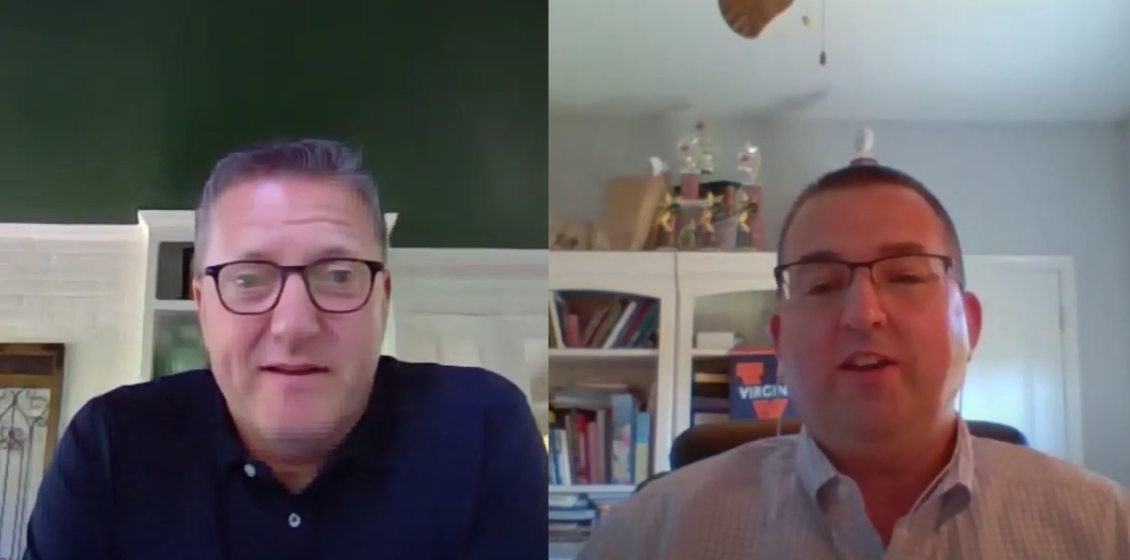A proponent of in-person collaboration, Aramark’s Stephen Mallozzi had to quickly pivot in his approach to workshopping ideas with colleagues when the pandemic hit. While digital tools are available to help employees work on virtual whiteboards, it just wasn’t the same as working in person.
“With project teams, I’m used to leading spend hours in rooms with whiteboards,” said the SVP of HR operations of the Center City-based food service, facilities and uniform services provider. “That’s harder to do when people are dispersed and working remotely.”
More than a year into the pandemic, remote work has become part of the new normal for many professionals around the world. Remote work has brought into question what geographic location can mean for a company, and some business leaders are tired of it and ready to return to the office. Not all workers feel that way, though.
In a fireside chat during Philly Tech Week presented by Comcast’s Introduced by Technical.ly conference, Mallozzi and Lloyd Adams, SVP and managing director at SAP — the international enterprise software company with its North American headquarters in Newtown Square — discussed ways in which remote work has changed how they and their colleagues work on a daily basis.
Moderation is an important part of working from home.
Don’t forget: Work-from-home burnout is real.
Mallozzi noticed very quickly that the change in people’s work routines as they worked from home was resulting in people doing more work than before. The blurry line between people’s professional and personal lives was something that had to be managed in order for employees to be as healthy as possible.
“You no longer have a commute to work and I found a lot of people burning the candle at both ends, almost justifying the change,” he said. “That worked well in the beginning but we had to moderate that. The pandemic created a lot of stress outside of the work.”
Employer resource groups have been valuable for social connection.
At first, the pandemic was only expected to last weeks. Relegated to their homes instead of being able to go into the office wore on employees from a social perspective. Employee resource groups connected employees who missed connecting with their peers in person.
“We pushed on ERGs so that people had co-employees,” Mallozzi said. “Working remotely for months, we saw isolation set in. You’re not getting to grab a cup of coffee with somebody and you’re not grabbing lunch with someone.”
Professionals expect to work with technology that’s as intuitive as the tech in their personal lives.
In 2019, Aramark made the decision to do a global installation of HR software SAP SuccessFactors for its employees. With more employees working from home during the pandemic, the way employees use work technology and personal tech like Amazon’s Alexa has collided — and that 2019 update has bridged the gap for Aramark, according to Mallozzi.
“‘Intuitive’ is the name of the game if I think about the technology people use from home,” he said. “In a matter of minutes you can feel your way around on Amazon and see what you need. What we’re striving for at Aramark is to duplicate that feeling and allowing the access to make it as intuitive as possible where you don’t need a lot of help. We want to empower and enable our employees.”
And using Zoom, Microsoft Teams and other digital tools has allowed organizations to connect employees working remotely, Adams said, but they still require an understanding of emotional intelligence in order to make employees feel most supported.
“We need to be judicious about how and when we apply technology,” he said — be careful of demanding too much screen time. “Empathy and being comfortable with things being fluid has been really important. COVID has necessitated companies being adept at moving forward.”
2020 has increased accountability for companies looking to hire new talent.
According to Mallozzi, hiring has taken on a new level of accountability at Aramark. A year that has included a pandemic, a social justice movement and a hotly contested presidential election has changed the way job candidates and employees look at the companies that may hire them.
“Employees want to know more about DEI and planning,” he said. “That was always a part of the process but has taken on a greater emphasis,” he said. “For our organization, we’ve always had such a strong commitment to DEI, but I don’t if we always translated it in a way where it always worked with what we do. That’s taking on a much more prominent role for us. You’ve got to sell your company to a candidate more so than you have in the past.”
Changes companies make now will support growth beyond the pandemic.
Adams said that the unique ways in which companies and organizations have responded to the pandemic will only make companies and organizations more appealing to job candidates in the future when it’s over.
“Flashing forward, there will be a bottom-line impact in improvement in quality of life and how much companies spend on that,” he said.
Watch their full conversation here:







